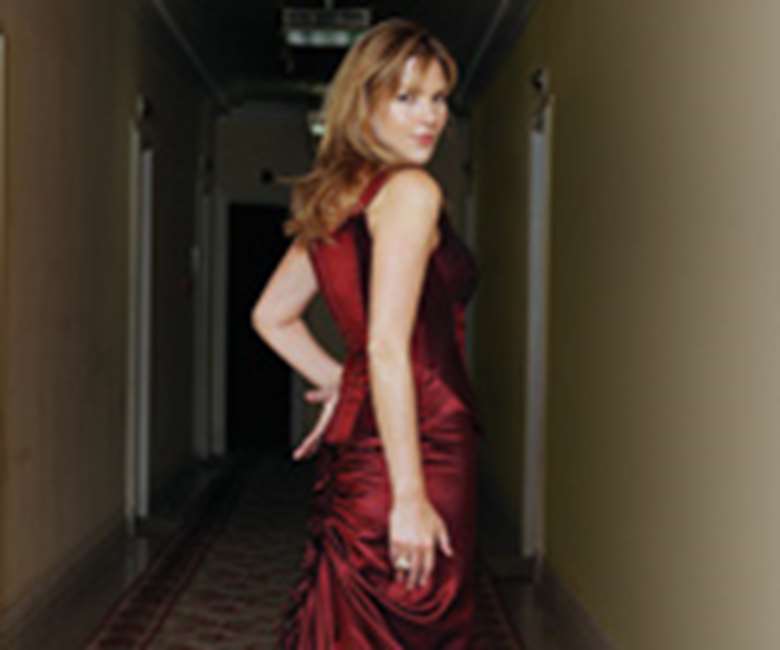Diana Krall - Little Girl Blue
Thursday, August 31, 2006
Diana Krall hates labels as she detests the feeling of being boxed in. Embarrassed at being thought of as a new Ella Fitzgerald, she tells Jane Cornwell how she has moved on from the last, deeply felt album of songs many of which were co-written with husband Elvis Costello. It’s time instead to embrace again her roots, to explore richly satisfying jazz standards such as ‘Day in, Day Out’, ‘Exactly Like You’ and ‘From This Moment On’, the title track of the new album out this month, co-produced with Tommy LiPuma.

The Canadian pianist and singer made her name internationally by immersing herself in the classic jazz vocal songbook, encouraged by the great bassist Ray Brown, and on the new album she returns to the fold in the company of the Clayton-Hamilton Jazz Orchestra. As she embarks on a new happier stage in her life, in the public eye more than ever before as a jazz superstar and an expectant mother, she explodes some commonly held notions about her career, explains what she really wants to achieve in jazz and settles some old scores.
The pianist tinkling the ivories in the dining room of Claridges has no idea who the guest in Suite 301 is. This is probably a good thing, news that Diana Krall is in the building might well cause their fingers to seize in the middle of ‘Against All Odds’, or whatever cheesy track it is they’re playing. Notes waft blandly around the art deco surroundings, diners chat, clink glasses and dab at their mouths, oblivious. Waiting there I imagine someone else making music in the corner, someone who befits the glamorous decor. Someone from the Golden Era of song making, say Cole Porter, Ella Fitzgerald or Nat King Cole in his prime. And given her oeuvre, even Krall herself. Blonde hair in a pompadour, long legs in nylon stockings, wielding her emotive, lived-in alto.
The jazz superstar probably isn’t about to sashay in, elbow the hapless pianist off the bench and launch into a selection of standards off her new, tenth album, From This Moment On. A beautifully arranged, deftly produced, swinging triumph of an album, buoyed by Krall’s illustrious trio – Anthony Wilson on guitar, Jeff Hamilton on drums, John Clayton on upright bass – and the rather magnificent Clayton/Hamilton Jazz Orchestra. With a title borrowed from Cole Porter’s romantic ode to great expectations (‘No more blue songs/Only whoop de do songs’), her new album boasts 11 tunes that, taken together, form an upbeat, cohesive whole. Which, as it turns out, wasn’t specifically the intention.
In planning her follow-up to 2004’s The Girl In the Other Room, an introspective bundle of covers and, pretty much a first for Krall, originals co-written with her husband, Elvis Costello, Krall simply jotted down a list of songs. Many had been in her back pocket for years: ‘Day In, Day Out’, which the 41-year-old began working on in her late teens, when a student at Boston’s Berklee College of Music; ‘How Insensitive’, which she’s been figuring out for a decade; ‘I Was Doing All Right’, ‘Come Dance With Me’ and ‘You Can Depend On Me’, all of which she’d listened to as a girl in Nanaimo in British Columbia. They are a legacy of her record-collecting, stride piano-playing dad, Jim, an accountant. She says she was practising by playing along to Fats Waller, the moment her feet reached the pedals. Duke Ellington seduced her at an early age.
So did Fred Astaire, Count Basie and Ray Brown. There are traces of all of them on the new album, just as there are traces of Ella Fitzgerald, Shirley Horn and Sarah Vaughan. But thanks in part to long-time producer Tommy LiPuma and arranger/bandleader John Clayton, Diana Krall still sounds like no one other than Diana Krall. Her delivery is more confident, too; her phrases even more perfectly placed. Sure, there’s a moment on her delicate rendition of ‘Little Girl Blue’ when it could be Joni Mitchell singing the line ‘Count your fingers’ – which delights Krall no end when it’s suggested to her later. (“Really? That’s a nice compliment. If I was going to want to sound like anybody it would be her.”) Imitation is indeed the sincerest form of flattery – more so, perhaps, when it’s completely unconscious. “Isn’t it a lov-e-ly day... to be... caught... in the rain.”
To read the rest of this article subscribe here